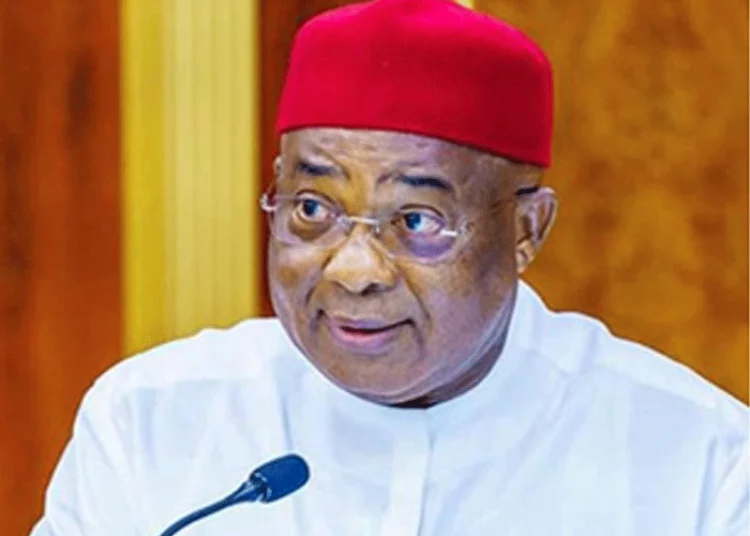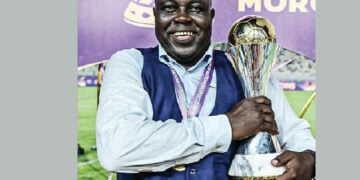From crisis to renewal, he has turned adversity into opportunity and restored confidence in governance.
A Test of Character
When Senator Hope Odidika Uzodimma became governor of Imo State on January 15, 2020, the odds were stacked against him.
His emergence stirred controversy; public trust was uncertain. But five years on, the verdict is clear: he has not only survived the skepticism — he has rewritten the story.
Through disciplined reforms, political maturity, and bold infrastructure renewal, Uzodimma has repositioned Imo as a state on the move — balancing empathy with efficiency, and prudence with progress.
Leadership is not about how you begin; it is about what you make possible for your people.
Restoring Confidence in Governance
From his first day in office, Uzodimma made an unusual gesture — he paid the January 2020 salaries of political appointees from the outgoing administration.
That simple act of fairness sent a message: this government would build, not break; unite, not divide.
Soon after, he provided free luxury buses for civil servants commuting to the State Secretariat — easing their daily burden and reinforcing dignity in public service. Those buses still ply the roads today, a quiet reminder of his hands-on compassion.
When the COVID-19 pandemic struck, Uzodimma turned crisis management into community care — mobilising relief support for both Christian and Muslim groups and ensuring that no community was left behind. His administration restored long-stalled promotions in the civil service and cleared backlogs of entitlements — a promise long denied to workers.
Reclaiming Education, Rebuilding Institutions
Few governors have been as assertive in reclaiming public assets as Uzodimma.
When the state-owned Eastern Palm University, built with public funds, was controversially converted to private ownership, Uzodimma intervened decisively — repossessing and renaming it Kingsley O. Mbadiwe University, a victory for transparency and public accountability.
He also rescued Imo State University’s College of Medicine, which had lost accreditation for years, ensuring the programme regained full status and resumed training doctors.
Through his quiet diplomacy, Alvan Ikoku Federal College of Education was upgraded to a Federal University of Education, while Federal Medical Centre, Owerri, became the Federal University Teaching Hospital, expanding access to tertiary healthcare and medical training.
Today, Imo boasts a constellation of higher institutions — from the University of Agriculture and Environmental Sciences (UAES) to upgraded nursing schools and polytechnics — giving the state an education network that rivals any in the South-East.
He fights not for ownership, but for the people’s right to benefit from what they already built.
A City Reclaimed
For years, Douglas Road, once the economic heart of Owerri, was a symbol of urban decay — overrun by traders, waste, and lawlessness.
Uzodimma’s urban renewal campaign changed that.Through enforcement and rehabilitation, the street is now clean, safe, and bustling with legitimate trade again.
Beyond Douglas Road, the governor’s massive road reconstruction has opened up the state’s arterial routes — including the Owerri–Okigwe, Owerri–Mbaise–Umuahia, Owerri–Orlu, and Orlu–Ugah–Akokwa roads, all previously under federal neglect.
Even the challenging Owerri–Omarelu Road is under active reconstruction, enhancing inter-state trade and security.
Bridging Governance and Growth
As Chairman of the Progressive Governors Forum (PGF), Uzodimma has emerged as one of the most strategic voices in Nigeria’s political leadership.
His role has elevated Imo State as a centre of national dialogue — culminating in the 2025 launch of his book, A Decade of Impactful Progressive Governance in Nigeria, which drew President Bola Ahmed Tinubu and 26 governors to Owerri.
At the same event, President Tinubu commissioned the twin flyover at Assumpta Roundabout, easing congestion on one of the busiest gateways in the South-East.
Uzodimma’s growing stature among his peers reflects a leader who understands that governance is not competition, but collaboration.
A Digital Future for Imo Youth
If infrastructure defines the body of his administration, youth empowerment defines its soul.
Under the Skill-Up Imo Project, more than 50,000 young people have been trained in fields such as software engineering, artificial intelligence, cybersecurity, and digital marketing.
Participants from cohorts 1 to 3 received laptops and startup kits, with many now working remotely for global tech firms or running their own ventures.
The project, one of Nigeria’s largest state-led digital training schemes, has positioned Imo as a digital talent hub and a leader in youth reskilling.
He is building not just roads and bridges, but minds equipped for a digital world.
Securing Lives, Rebuilding Peace
The 2021 jailbreak in Owerri and the surge in insecurity tested Imo’s resilience — but Uzodimma’s response was firm and strategic.
By reinforcing local intelligence, supporting security agencies with vehicles and communication tools, and engaging traditional rulers and youth leaders, he reclaimed territories once under insurgent control.
Communities in Orsu, Okigwe, and surrounding LGAs have regained stability, and commerce has resumed where fear once prevailed.
His administration’s balanced approach — combining deterrence with dialogue — has made Imo one of the safer states in the South-East once again.
Health, Faith, and Humanity
Uzodimma’s healthcare reforms include the Imo State Health Insurance Scheme, which has drastically reduced maternal and child mortality rates and won national acclaim as Best Health Insurance and Managed Care Government Agency in Provider Network and Performance Management 2025.
He has also maintained a tradition of spiritual inclusivity — sponsoring hundreds of pilgrims to Israel and supporting the Muslim community’s annual Hajj.
To him, leadership is service without prejudice, and faith is a tool for peace.
A Governor Reborn by Service
At 66, Hope Uzodimma has become a symbol of political endurance — a governor who learned that power finds meaning only when it uplifts people.
His early years as a senator taught him negotiation and patience; governance has taught him purpose.
In every sense, he represents the bridge between the old order of politics and a new era of performance-driven leadership.
His journey reminds us that history is kind to those who deliver.





